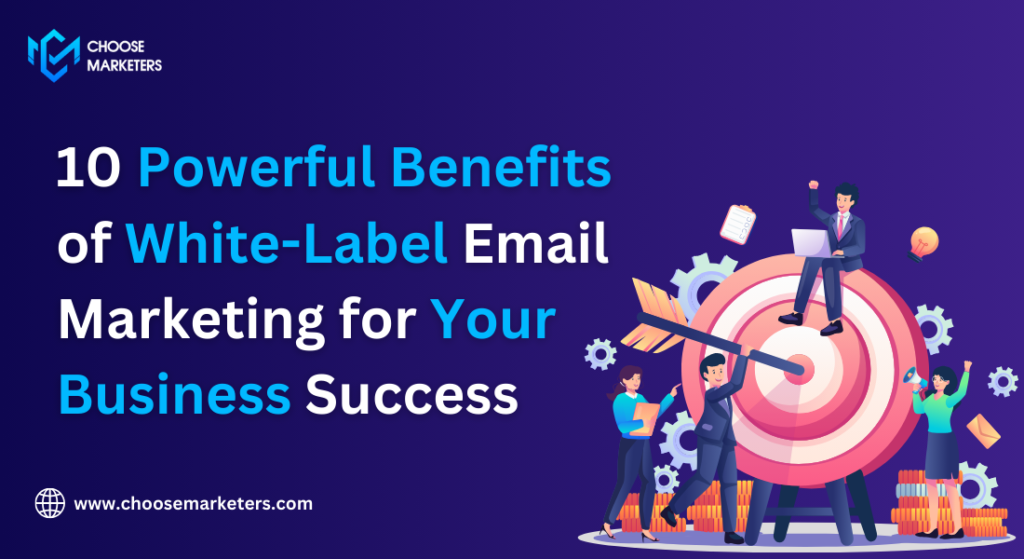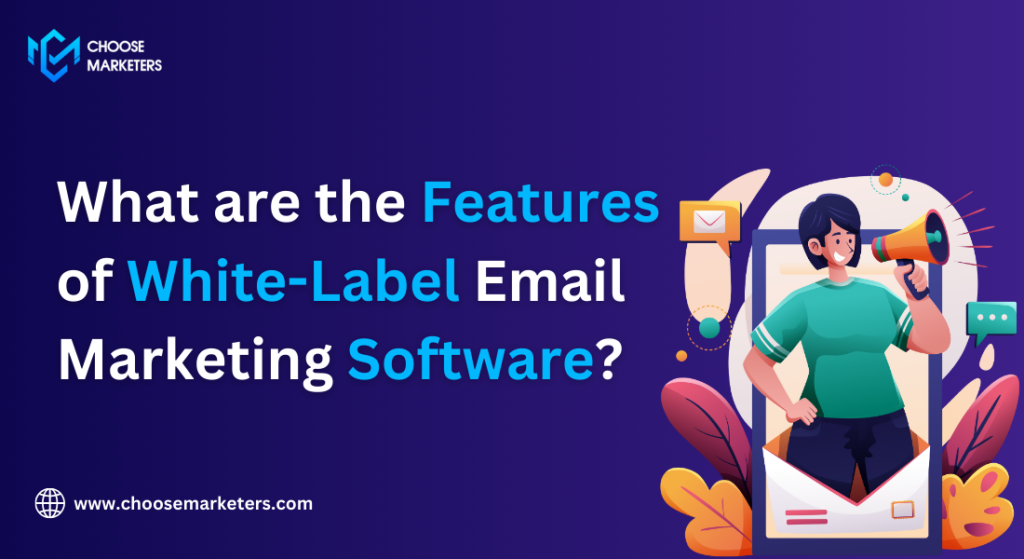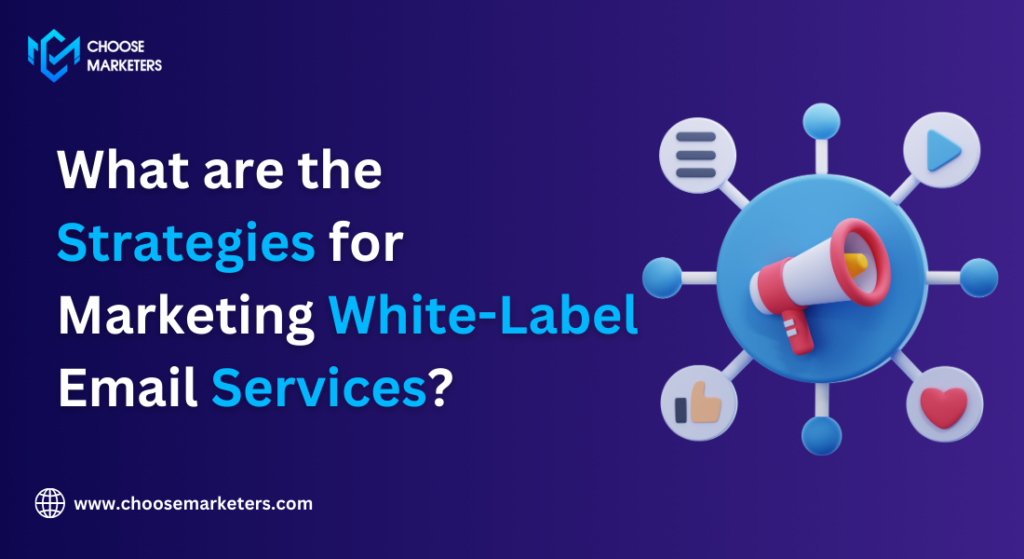

10 Benefits of White-Label Email Marketing for Business Success
White-label email marketing helps businesses provide valuable services to their clients without the complexity of managing the technology behind it. It empowers them to enhance their offerings and create more marketing strategies that can lead to increased client satisfaction and business growth.

What is White-Label Email Marketing?
White-label email marketing is a service where one company creates email marketing software or solutions, and another company sells it under its brand. This means that businesses can offer email marketing services to their clients without needing to build their technology from scratch. It’s like buying a ready-made cake and putting your frosting on it.
How Does It Work?
In white-label email marketing, a business partners with a provider that offers these services. The provider develops the software and tools needed for email marketing, such as creating, sending, and managing email campaigns. The partnering business can then brand these tools with their name and logo. This allows them to provide a complete email marketing solution to their clients without the high costs and time associated with developing their software.
Why is it Important?
For many businesses, especially small and medium-sized ones, offering email marketing services can be a great way to attract and retain clients. Email marketing is a powerful tool for reaching customers directly, and many companies want to leverage this without having to learn the technical details or invest heavily in technology.
Examples of Use in the USA
Many marketing agencies in the USA utilize white-label email marketing. For instance, a digital marketing agency in California might partner with a white-label provider to offer email campaigns, newsletters, and automated responses for local businesses. Similarly, a small business in Texas might use a white-label service to send promotional emails to its customers, ensuring that they stay engaged and informed.
What are the Benefits of White-Label Email Marketing?
White-label email marketing offers numerous advantages for businesses looking to enhance their service offerings and provide value to their clients. Here are some key benefits:
Cost Savings
Implementing white-label solutions can significantly reduce costs. Instead of investing in expensive software development, businesses can purchase access to ready-made tools and services. This means they can allocate their budgets to other important areas like marketing and customer service.
Quick Deployment
With white-label email marketing, companies can launch their services much faster. They don’t have to go through the lengthy process of building software from scratch. Instead, they can start offering email marketing services almost immediately, allowing them to respond quickly to market demands.
Focus on Core Services
By using white-label solutions, businesses can focus on their core competencies. They can spend more time on strategy, client relationships, and service delivery instead of dealing with the technical challenges of email marketing. This focus can lead to better customer service and satisfaction.
Custom Branding Opportunities
White-label services allow businesses to customize the tools and platforms with their branding. This personalization helps create a cohesive brand experience for clients, making the email marketing services feel unique and tailored to the customer’s needs.
Access to Advanced Features
Many white-label email marketing platforms come equipped with advanced features that businesses might not have the resources to develop themselves. This includes automation tools, analytics, segmentation, and A/B testing capabilities. Access to these features can improve the effectiveness of email campaigns.
Scalability
White-label email marketing solutions are often scalable, meaning that businesses can easily adjust their services to meet the growing needs of their clients. Whether they want to send more emails or expand into new markets, these platforms can grow alongside them.
Enhanced Client Offerings
By incorporating white-label email marketing into their services, businesses can provide a more comprehensive marketing solution. This can make them more attractive to potential clients who are looking for all-in-one marketing services.
Competitive Advantage
In a competitive market, offering white-label email marketing services can set a business apart. It allows companies to provide value-added services that enhance their overall offerings, making them more appealing to clients looking for effective marketing solutions.
Ongoing Support and Updates
Many white-label providers offer ongoing support and updates as part of their services. This means businesses don’t have to worry about maintaining the software or keeping it current with the latest trends and regulations. This support can be invaluable for companies that want to ensure their clients receive the best possible service.
Improved Customer Relationships
With effective email marketing, businesses can strengthen their relationships with clients. Regular communication through well-crafted email campaigns can keep customers engaged and informed, leading to higher retention rates and customer loyalty.
What are the Features of White-Label Email Marketing Software?
White-label email marketing software offers a range of features designed to enhance email campaigns and streamline the user experience.

Here are seven essential features to look for:
1. Customizable Templates
White-label platforms typically provide a variety of customizable email templates. Users can easily adapt these templates to fit their brand’s colors, images, and messaging, ensuring a cohesive brand identity across communications.
2. Drag-and-Drop Editor
A user-friendly drag-and-drop editor simplifies the email creation process. This feature allows users to design their emails easily by dragging elements into place, making it accessible for those without technical skills.
3. Automation Tools
Automation features enable businesses to schedule emails and set up workflows for tasks like welcome emails and follow-ups. This saves time and ensures that customers receive timely communications without manual effort.
4. List Segmentation
Segmentation allows users to categorize their email lists based on specific criteria, such as demographics or behavior. This targeted approach helps deliver personalized messages that resonate with different audience groups.
5. Analytics and Reporting
Robust analytics and reporting tools are crucial for measuring campaign success. Users can track important metrics, such as open rates and click-through rates, helping them understand performance and refine their strategies.
6. A/B Testing
A/B testing, or split testing, lets businesses compare different versions of an email to determine which performs better. This feature is key for optimizing email content and design to maximize engagement.
7. Integration Capabilities
The ability to integrate with other tools, such as customer relationship management (CRM) systems and e-commerce platforms, is vital. This feature helps businesses streamline their marketing efforts and manage customer data effectively.
What are the Selection Criteria for Choosing White-Label Email Marketing Software?
When selecting a white-label email marketing software, it’s essential to consider various criteria to ensure the chosen platform meets your business needs effectively. Here are three critical selection criteria to keep in mind:
Core Functionality
The core functionality of white-label email marketing software is fundamental to its effectiveness. Key features to look for include customizable templates, automation capabilities, list segmentation, and reporting tools. These functionalities ensure that the platform can handle various email marketing tasks efficiently, from creating engaging content to analyzing campaign performance. A robust platform should also support essential compliance features to adhere to regulations like the CAN-SPAM Act and GDPR, ensuring that your marketing efforts are both effective and legal.
User Experience and Interface
A user-friendly interface is vital for ensuring that both the business and its clients can navigate the software with ease. The design should be intuitive, allowing users to access features quickly without extensive training. A streamlined user experience enhances productivity and reduces frustration, enabling users to focus on creating effective email campaigns. Look for platforms that offer helpful tutorials or customer support resources, as these can further improve the overall user experience.
Customization Options
Customization is a significant advantage of white-label email marketing software. The ability to personalize the platform with your branding such as logos, colors, and domain names can help create a cohesive brand experience for your clients. Additionally, customization options should extend to email templates and automation workflows, allowing businesses to tailor their offerings to meet specific client needs. This flexibility not only enhances the user experience but also strengthens brand identity in the competitive landscape of email marketing.
What are the Top White-Label Email Marketing Software for 2024?
As businesses increasingly recognize the value of white-label email marketing solutions, several software options have emerged as top contenders in 2024. Here’s a look at some of the best white-label email marketing software available this year:
1. Mailmunch
Mailmunch is known for its powerful email marketing tools, offering customizable templates and automation features. Its user-friendly interface makes it easy for businesses to create and manage email campaigns effectively. The platform also provides detailed analytics and reporting to help users track performance.
2. Stripo
Stripo offers a unique drag-and-drop editor that allows users to design responsive emails with ease. Its white-label solution comes with various customization options, enabling businesses to align the platform with their branding. Stripe also supports A/B testing and integrates seamlessly with other marketing tools.
3. Sendinblue
Sendinblue is a versatile platform that combines email marketing with SMS marketing capabilities. Its white-label solution includes automation tools, segmentation features, and customizable templates. With a focus on user experience, Sendinblue provides a straightforward interface and robust analytics for campaign tracking.
4. GetResponse
GetResponse is an all-in-one marketing platform that includes email marketing, landing pages, and webinar solutions. Its white-label features allow businesses to offer a branded experience to their clients. The platform also offers automation, segmentation, and comprehensive reporting tools to enhance marketing efforts.
5. ActiveCampaign
ActiveCampaign is a leading choice for businesses looking for advanced email marketing automation. Its white-label offering includes powerful segmentation and personalization features, making it easy to target specific audience groups. The platform also provides detailed analytics to measure campaign success effectively.
6. Constant Contact
Constant Contact is widely recognized for its ease of use and excellent customer support. Its white-label solution offers customizable templates, automation tools, and a variety of integrations. With a focus on small to medium-sized businesses, Constant Contact helps users create impactful email campaigns quickly.
7. AWeber
AWeber is a popular choice among entrepreneurs and small businesses for its straightforward email marketing features. Its white-label platform allows users to customize branding and offers robust automation tools. AWeber also provides useful resources and support for users to enhance their email marketing strategies.
8. Klaviyo
Klaviyo is known for its advanced data-driven email marketing capabilities. Its white-label solution focuses on e-commerce businesses, providing personalized email experiences based on customer behavior. Klaviyo’s analytics and reporting features help businesses optimize their marketing efforts effectively.
9. Benchmark Email
Benchmark Email offers a feature-rich white-label email marketing solution with customizable templates, automation tools, and detailed reporting. Its user-friendly interface makes it easy for businesses to create and manage email campaigns while maintaining their brand identity.
10. Omnisend
Omnisend specializes in e-commerce email marketing, offering a white-label solution tailored for online retailers. Its platform includes automation workflows, segmentation, and integration with e-commerce platforms, allowing businesses to drive sales through effective email marketing strategies.
How to Set Up Your White-Label Email Marketing Service?
Setting up a white-label email marketing service can be an exciting venture for businesses looking to offer email marketing solutions under their brand. Here’s a step-by-step guide to help you get started:
1. Choose the Right White-Label Software
The first step is selecting the right white-label email marketing software that meets your needs. Consider factors like core functionality, user experience, and customization options. Review the shortlist of best options to find a platform that aligns with your business goals and offers the features you require.
2. Customize Your Branding
Once you’ve selected a software solution, customize it to reflect your brand identity. This includes adding your logo, choosing brand colors, and modifying email templates to match your style. Consistent branding helps build trust and recognition among your clients.
3. Set Up Email Lists and Segmentation
Create email lists based on your target audience. Organize these lists to facilitate effective segmentation, allowing you to send personalized messages to specific groups. This targeted approach increases engagement and enhances the overall effectiveness of your email campaigns.
4. Develop Email Campaign Strategies
Plan your email marketing strategies, including the types of campaigns you want to run. Consider creating a mix of promotional, informational, and engaging content to keep your audience interested. Determine the frequency of your emails and develop a content calendar to stay organized.
5. Create Engaging Content
Focus on creating high-quality, engaging content for your email campaigns. Use catchy subject lines, clear calls to action, and visually appealing designs. Ensure that your content is relevant to your audience and encourages them to take action, whether it’s visiting your website or making a purchase.
6. Test Your Emails
Before launching any email campaign, test your emails to ensure they render correctly across different devices and email clients. Check for broken links, formatting issues, and typos. Testing helps avoid errors that could damage your credibility and effectiveness.
7. Monitor Performance and Optimize
After launching your campaigns, monitor their performance using the analytics and reporting tools available in your white-label software. Pay attention to key metrics like open rates, click-through rates, and conversions. Use this data to optimize future campaigns and refine your strategies.
8. Provide Excellent Customer Support
As you grow your white-label email marketing service, ensure that you offer excellent customer support to your clients. Respond to inquiries promptly and provide helpful resources, such as guides or tutorials, to enhance their experience and success.
What are the Strategies for Marketing White-Label Email Services?
Marketing your white-label email services effectively is crucial for attracting clients and growing your business.

Here are some proven strategies to help you promote your services successfully:
1. Define Your Target Audience
Start by identifying your target audience. Understanding who your ideal clients are will help you tailor your marketing messages and strategies. Consider factors such as industry, business size, and specific needs related to email marketing.
2. Create a Professional Website
A professional website serves as the foundation of your online presence. Ensure that your website clearly outlines the services, features, and benefits of your white-label email marketing solution. Include case studies, testimonials, and a blog to showcase your expertise and attract organic traffic.
3. Utilize Social Media Marketing
Leverage social media platforms like Facebook, Twitter, and Linkedin to promote your white-label email services. Share engaging content, tips, and success stories related to email marketing. Use targeted ads to reach your ideal audience and drive traffic to your website. Engaging with your followers can also help build relationships and trust. Engaging with your followers can also help build relationships and trust. Additionally, consider using white-label social media marketing.
4. Offer Free Trials or Demos
Providing free trials or demos of your white-label email services can entice potential clients to try your platform. This hands-on experience allows them to see the value of your services firsthand, increasing the likelihood of conversion to paid plans.
5. Develop Content Marketing Strategies
Content marketing is an effective way to demonstrate your expertise in email marketing. Create informative blog posts, videos, or infographics that address common questions or challenges faced by businesses in email marketing. This valuable content can attract potential clients and establish your authority in the field.
6. Network and Collaborate
Attend industry events, webinars, and local business gatherings to network with potential clients and partners. Consider collaborating with complementary businesses, such as web designers or marketing agencies, to expand your reach and offer combined services.
7. Implement Email Marketing Campaigns
Ironically, use email marketing to promote your white-label services! Create targeted email campaigns highlighting the benefits of your services, success stories, and special offers. Ensure your emails are well-designed and engaging to showcase your skills.
8. Focus on Customer Retention
Acquiring new clients is essential, but retaining existing clients is equally important. Provide exceptional customer support, regularly check in with clients, and offer ongoing training or resources to ensure they are satisfied with your services. Happy clients are more likely to refer others to your business.
9. Gather and Showcase Testimonials
Collect testimonials and case studies from satisfied clients. Display these on your website and marketing materials to build credibility and trust with potential customers. Positive reviews can significantly influence purchasing decisions.
10. Optimize for Search Engines (SEO)
Ensure that your website and content are optimized for search engines. Use relevant keywords related to white-label email marketing throughout your site, including in blog posts and service descriptions. This optimization can help increase your visibility and attract organic traffic.
Which USA States are Relevant for White Label Email Marketing?
When considering white-label email marketing services, certain states in the USA are more prominent due to their thriving business environments and strong digital marketing industries. Here are ten states where white-label email marketing can have a significant impact:
California
Known for its tech hubs like Silicon Valley, California is home to many startups and established companies looking for innovative marketing solutions.
New York
As a global business center, New York has a diverse market where businesses need effective email marketing to reach their audience.
Texas
With a booming economy and a growing number of businesses, Texas presents numerous opportunities for white-label email marketing services.
Florida
Florida’s large population and tourism industry create a unique market for targeted email campaigns, making it a prime state for email marketing.
Illinois
Home to Chicago, Illinois has a robust business community that can benefit from white-label email marketing solutions.
Washington
With companies like Amazon and Microsoft, Washington’s tech-savvy market is an excellent place for innovative email marketing strategies.
Massachusetts
Known for its education and healthcare sectors, Massachusetts offers unique opportunities for targeted email marketing campaigns.
Georgia
Atlanta is a growing business hub, making Georgia a key state for companies seeking effective email marketing solutions.
Colorado
With a strong entrepreneurial spirit, Colorado has a growing number of businesses that can leverage white-label email marketing.
North Carolina
North Carolina’s diverse economy, particularly in technology and finance, creates a demand for effective email marketing strategies.
What are the Common Challenges and Solutions in White-Label Email Marketing?
White-label email marketing can provide businesses with a fantastic opportunity to offer valuable services under their brand. However, like any business venture, it comes with its own set of challenges. Here are some common challenges in white-label email marketing and practical solutions to overcome them:
1. Limited Brand Recognition
- Challenge: When offering white-label services, your brand might not be as recognizable as established competitors, making it harder to attract clients.
- Solution: Focus on building a strong brand identity through professional branding, a well-designed website, and consistent marketing efforts. Share success stories and testimonials to establish credibility and trust with potential clients.
2. Quality Control
- Challenge: Maintaining consistent quality across different email campaigns can be difficult, especially when managing multiple clients.
- Solution: Develop clear guidelines and best practices for email design and content. Regularly review campaigns and provide feedback to ensure quality standards are met. Utilize templates that align with your brand to streamline the process.
3. Understanding Client Needs
- Challenge: Different clients have unique goals and needs, which can complicate your service offerings.
- Solution: Conduct thorough consultations with clients to understand their specific requirements. Create customized strategies that align with their objectives while still utilizing your core white-label services.
4. Technical Issues
- Challenge: Technical problems, such as deliverability issues or software glitches, can disrupt email campaigns and frustrate clients.
- Solution: Choose reliable white-label email marketing software known for its performance and support. Stay informed about technical issues and maintain a dedicated support team to quickly resolve any problems that arise.
5. Compliance with Regulations
- Challenge: Navigating email marketing regulations, such as the CAN-SPAM Act and GDPR, can be complex and may vary by region.
- Solution: Educate yourself and your clients about relevant regulations. Ensure that your white-label service complies with all legal requirements, such as obtaining consent for email marketing and providing clear unsubscribe options.
What are the Future Trends in White-Label Email Marketing?
As the digital marketing landscape evolves, white-label email marketing will see several emerging trends. Here are five key trends shaping the future of this industry:
1. Increased Personalization
Personalization will continue to be crucial in email marketing. Future white-label services will focus on creating hyper-personalized content that resonates with individual recipients. By leveraging data and analytics, businesses can craft tailored experiences that reflect the preferences and behaviors of their clients’ audiences.
2. Automation and AI Integration
Automation and artificial intelligence (AI) will revolutionize email marketing. White-label services will increasingly incorporate AI-driven tools for segmentation, predictive analytics, and automated campaign management. This integration will enhance efficiency, allowing businesses to optimize their email strategies and improve user experiences.
3. Enhanced Analytics and Reporting
Clients will demand more insights into their email marketing performance. As a result, white-label services will need to provide enhanced analytics and reporting capabilities, offering detailed metrics on open rates, click-through rates, and conversion rates. This data will enable businesses to make informed decisions and refine their strategies.
4. Focus on Compliance and Privacy
With growing concerns about data privacy and regulations, white-label email marketing services will prioritize compliance. Adhering to laws like GDPR and ensuring transparent data practices will be essential. Businesses demonstrating a commitment to privacy will build trust with clients and their audiences.
5. Interactive Content
Interactive content, such as polls, quizzes, and videos, will gain popularity in email marketing. White-label services will incorporate features that allow clients to create engaging, interactive emails that capture recipients’ attention and encourage them to take action.
Frequently Asked Questions (FAQs)
1. What is white-label email marketing?
White-label email marketing allows businesses to offer email marketing services under their brand. It involves using a third-party platform that provides tools and resources. This enables companies to provide professional email solutions without developing their software.
2. What are the benefits of white-label email marketing?
The benefits include increased revenue, access to professional tools, and the ability to enhance brand services. Businesses can save time and resources while providing quality email marketing solutions to their clients. This helps build trust and retain customers.
3. How do I choose the right white-label email marketing software?
When choosing software, consider features, user experience, customization options, and pricing. Look for platforms that offer robust analytics and support. Ensuring the software meets your client’s needs is key to successful marketing efforts.
4. Can I customize white-label email marketing solutions?
Yes, most white-label email marketing solutions allow for customization. You can add your branding elements, such as logos and colors. This ensures that the email campaigns align with your brand identity and message.
5. How can I measure the success of my email campaigns?
Success can be measured through key metrics like open rates, click-through rates, and conversion rates. Using analytics tools provided by the email platform can help track performance. Regularly reviewing these metrics will inform future campaign strategies.

